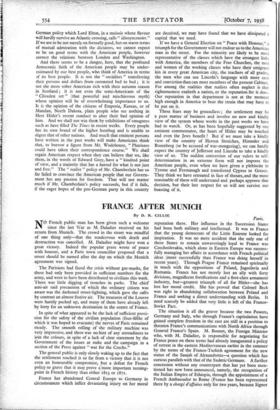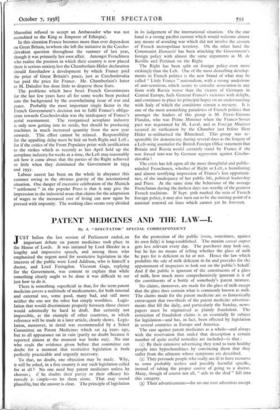FRANCE AFTER MUNICH
By D. R. GILLIE
NO French public man has been given such a welcome since the last War as M. Daladier received on his return from Munich. The crowd in the street was mindful of one thing only—that the rendezvous with death and destruction was cancelled. M. Daladier might have won a great victory. Indeed the popular press wrote of peace with honour, and a Paris town councillor proposed that a street should be named after the day on which the Munich agreement was signed.
The Parisians had faced the crisis without gas-masks, for these had only been provided in sufficient numbers for the army, and were to have been distributed to civilians this week. There was little digging of trenches in parks. The chief anti-air raid precaution of which the ordinary citizen was aware was the darkened street-lighting, which gave the cafés by contrast an almost festive air. The treasures of the Louvre were hastily packed up, and many of them have already left by lorry for an unknown destination in the centre of France.
In spite of what appeared to be the lack of sufficient provi- sion for the safety of the civilian population (four-fifths of which it was hoped to evacuate) the nerves of Paris remained steady. The smooth rolling of the military machine was very impressive, and there was no hint of any unreadiness to join the colours, in spite of a lack of clear statement by the Government of the issues at stake and the campaign in a section of the Press against " war for the Czechs."
The general public is only slowly waking up to the fact that the settlement reached is so far from a victory that it is not even an honourable compromise, but a defeat for French policy so grave that it may prove a_more important turning- point in French history than either 1815 or 187x.
France has abandoned Central Europe to Germany in circumstances which inflict devastating injury on her moral Paris. reputation there. Her influence in the Succession States had been both military and intellectual. It was to France that the young democrats of the Little Entente looked for inspiration. It was no mere accident that the only one of these States to remain unwaveringly loyal to France was Czechoslovakia, which alone in Eastern Europe was success- fully managing her affairs in accordance with French political ideas (more successfully than France was doing herself in recent years). Through Prague France remained spiritually in touch with the oppositions of Poland, Jugoslavia and Rumania. France has not merely lost an ally with forty divisions, magnificent fortifications and a first-class armament industry, but—greatest triumph of all for Hitler—she has lost her moral credit. She has proved that Colonel Beck was right in abandoning collaboration between Poland and France and seeking a direct understanding with Berlin. It need scarcely be added that very little is left of the Franco- Soviet Pact.
The situation is all the graver because the two Powers, Germany and Italy, who through France's capitulation have gained complete freedom in the east are still in a position to threaten France's communications with North Africa through General Franco's Spain. M. Bonnet, the Foreign Minister who, with M. Daladier, is responsible for negotiating for France peace on these terms had already inaugurated a policy of retreat in the eastern Mediterranean earlier in the summer by the terms of the Franco-Turkish agreement for the new status of the Sanjak of Alexandretta—a question which has curious parallels with that of the Sudetic Germans. A further concession without any counterpart that has yet been men- tioned has now been announced, namely, the recognition of the Italian Empire of Ethiopia, through the appointment of a French Ambassador to Rome (France has been represented there by a chargé d'affaires only for two years, because Signor Mussolini refused to accept an Ambassador who was not accredited to the King as Emperor of Ethiopia).
In this situation France becomes more than ever dependent on Great Britain, to whom she left the initiative in the Czecho- slovakian question throughout the summer of last year, though it was primarily her own affair. Amongst Frenchmen who realise the position in which their country is now placed there is serious anxiety.lest the Chamberlain-Hitler declaration should foreshadow a development by which France paid the price of Great Britain's peace, just as Czechoslovakia has paid the price for France. Mr. Chamberlain's letter to M. Daladier has done little to disperse these fears.
The problems which have beset French Governments for the last few years have all for some weeks been pushed into the background by the overwhelming issue of war and peace. Probably the most important single factor in the French Government's decision not to fulfil France's obliga- tions towards Czechoslovakia was the inadequacy of France's aerial rearmament. The reorganised aeroplane industry is only now getting into its stride, but should be producing machines in much increased quantity from the new year onwards. This effort cannot be relaxed. Responsibility for the appalling delay must be laid on both Right and Left ; for if the critics of the Front Populaire point with justification to the strikes which as recently as last April held up the aeroplane industry for weeks at a time, the Left may reasonably ask how it came about that the parties of the Right achieved so little when they dominated the Government in 1934 and 1935.
Labour unrest has been on the whole in abeyance this summer owing to the obvious gravity of the international situation. One danger of excessive celebration of the Munich " settlement " in the popular Press is that it may give the impression in the industrial areas that claims for the adaptation of wages to the increased cost of living can now again be pressed with impunity. The working class seems very divided in its judgement of the international situation. On the one hand is a strong pacifist current which would welcome almost any means of avoiding war which did not involve the cession of French metropolitan territory. On the other hand the Communist Humanite has been attacking the Government's foreign policy with almost the same arguments as M. de Kerillis and Pertinax on the Right.
The Right has been split on foreign policy even more strikingly than the Left. One of the most disturbing develop- ments in French politics is the new brand of what may be called " Little France " nationalism, with a strong undertone of anti-semitism, which seems to consider association in any form with Russia worse than the victory of Germany in Central Europe, hails General Franco's victories with delight, and continues to place its principal hopes on an understanding with Italy of which the conditions remain a mystery. It is one of the most astonishing paradoxes of French politics that amongst the leaders of this group is M. Pierre-Etienne Flandin, who was Prime Minister when the Franco-Soviet pact was negotiated by M. Laval, and as Foreign Minister secured its ratification by the Chamber just before Herr Hitler re-militarised the Rhineland. This group was re- sponsible for denouncing during several days as the forgery of a Left-wing journalist the British Foreign Office statement that Britain and Russia would certainly stand by France if she was forced into war by German aggression against Czecho- slovakia !
The crisis has left upon all the more thoughtful and public- minded Frenchmen, whether of Right or Left, a humiliating and almost terrifying impression of France's lost opportuni- ties, of the inadequacy of her public life, political leadership and Press. At the same time the behaviour of the average Frenchman during the darkest days was worthy of the greatest French traditions. If Sept. 3oth marked the ruin of French foreign policy, it may also turn out to be the starting-point of a national renewal on lines which cannot yet be foreseen.















































 Previous page
Previous page